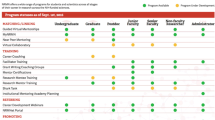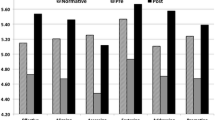Abstract
Increasing the diversity of the HIV research workforce remains a priority for research and funding organizations in the US. Mentorship is a vital component for early-career investigators, especially for underrepresented racial/ethnic and sexual minority HIV investigators. These investigators face unique social and structural challenges to developing and fostering mentorship relationships, as well as building a solid foundation for a successful career in HIV research. This article provides a perspective from four Black early-career investigators, supplemented with comments from 15 underrepresented investigators in the US, as they reflect on their needs, challenges, contributions, and successes in finding the right mentor and mentorship environment, balancing the opportunities for, and “threats” to success, as well as providing mentorship to other underrepresented and aspiring HIV investigators. Mentorship programs must address these needs and challenges while building on the strengths of underrepresented HIV investigators in order to improve recruitment, retention and ultimately the pipeline of these researchers.
Similar content being viewed by others
References
McGee R. Biomedical workforce diversity: the context for mentoring to develop talents and foster success within the “pipeline”. AIDS Behav. 2016. doi:10.1007/s10461-016-1486-7.
HIV Prevention Trials Network (HPTN) Scholars Program. https://www.hptn.org/research/scholars. Accessed 15 June 2016.
Rodríguez JE, Campbell KM, Fogarty JP, Williams RL. Underrepresented minority faculty in academic medicine. Fam Med. 2014;46(2):100–4.
Whittaker JA, Montgomery BL, Acosta VGM. Retention of underrepresented minority faculty: strategic initiatives for institutional value proposition based on perspectives from a range of academic institutions. J Undergrad Neurosci Educ. 2015;13(3):A136.
Keller TE, Collier PJ, Blakeslee JE, et al. Early career mentoring for translational researchers: mentee perspectives on challenges and issues. Teach Learn Med. 2014;26(3):211–6.
Forsyth AD, Stoff D. Key issues in mentoring in HIV prevention and mental health for new investigators from underrepresented racial/ethnic groups. Am J Public Health. 2009;99(S1):S87–91.
Wyatt GE, Williams JK, Henderson T, Sumner L. On the outside looking in: promoting HIV/AIDS research initiated by African American investigators. Am J Public Health. 2009;9(S1):S48–53.
Sopher CJ, Adamson BJ, Andrasik MP, et al. Enhancing diversity in the public health research workforce: the research and mentorship program for future HIV vaccine scientists. Am J Public Health. 2015;105(4):823–30.
Dolcini MM, Grinstead Reznick OA, Marín BV. Investments in the future of behavioral science: the University of California, San Francisco, Visiting Professors Program. Am J Public Health. 2009;99(Suppl 1):S43–7.
Check Hayden E. Racial bias continues to haunt NIH grants. Nature. 2015;527(7578):286–7.
Whittaker JA, Montgomery BL, Martinez Acosta VG. Retention of underrepresented minority faculty: strategic initiatives for institutional value proposition based on perspectives from a range of academic institutions. J Undergrad Neurosci Educ. 2015;13(3):A136–45.
Rodriguez JE, Campbell KM, Fogarty JP, Williams RL. Underrepresented minority faculty in academic medicine: a systematic review of URM faculty development. Fam Med. 2014;46(2):100–4.
Baral S, Logie CH, Grosso A, Wirtz AL, Beyrer C. Modified social ecological model: a tool to guide the assessment of the risks and risk contexts of HIV epidemics. BMC Public Health. 2013;13:482.
Rodríguez JE, Campbell KM, Mouratidis RW. Where are the rest of us? Improving representation of minority faculty in academic medicine. South Med J. 2014;107(12):739–44.
Yehia BR, Cronholm PF, Wilson N, et al. Mentorship and pursuit of academic medicine careers: a mixed methods study of residents from diverse backgrounds. BMC Med Educ. 2014;14:26.
Beech BM, Calles-Escandon J, Hairston KG, et al. Mentoring programs for underrepresented minority faculty in academic medical centers: a systematic review of the literature. Acad Med. 2013;88(4):541–9.
Brewer RA, Dyer T, Watson CC. Interviews with underrepresented HIV investigators. 2015. Unpublished work.
Chan AW, Yeh CJ, Krumboltz JD. Mentoring ethnic minority counseling and clinical psychology students: a multicultural, ecological, and relational model. J Couns Psychol. 2015;62(4):592–607.
Rodríguez JE, Campbell KM, Pololi LH. Addressing disparities in academic medicine: what of the minority tax? BMC Med Educ. 2015;15:6.
Hassouneh D, Lutz KF, Beckett AK, Junkins EP, Horton LL. The experiences of underrepresented minority faculty in schools of medicine. Med Educ Online. 2014;19:24768.
Pfund C, Byars-Winston A, Branchaw J, Hurtado S, Eagan K. Defining attributes and metrics of effective research mentoring relationships. AIDS Behav. 2016. doi:10.1007/s10461-016-1384-z.
Young Black Gay Mens Leadership Initiative. http://www.ybgli.org/. Accessed 15 June 2016.
Fuchs J, Kouyate A, Kroboth L, McFarland W. Growing the pipeline of diverse HIV investigators: the impact of mentored research experiences to engage underrepresented minority students. AIDS Behav. 2016. doi:10.1007/s10461-016-1392-z.
Haynes L, Adams SL, Boss JM. Mentoring and networking: how to make it work. Nat Immunol. 2008;9(1):3–6.
Waitzkin H, Yager J, Parker T, Duran B. Mentoring partnerships for minority faculty and graduate students in mental health services research. Acad Psychiatry. 2006;30(3):205–17.
Kahn JS, Greenblatt RM. Mentoring early-career scientists for HIV research careers. Am J Public Health. 2009;99(S1):S37–42.
Bozeman B, Feeney MK. Toward a useful theory of mentoring a conceptual analysis and critique. Adm Soc. 2007;39(6):719–39.
Detsky AS, Baerlocher MO. Academic mentoring—how to give it and how to get it. JAMA. 2007;297(19):2134–6.
Palepu A, Friedman RH, Barnett RC, et al. Junior faculty members’ mentoring relationships and their professional development in US medical schools. Acad Med. 1998;73(3):318–23.
Wingard DL, Garman KA, Reznik V. Facilitating faculty success: outcomes and cost benefit of the UCSD National Center of Leadership in Academic Medicine. Acad Med. 2004;79(10):S9–11.
Helm EG, Prieto DO, Parker JE, Russell M. Minority medical school faculty. J Natl Med Assoc. 2000;92(8):411–4.
Morzinski JA, Fisher JC. A nationwide study of the influence of faculty development programs on colleague relationships. Acad Med. 2002;77(5):402–6.
Thomas DA. The truth about mentoring minorities. Race matters. Harv Bus Rev. 2001;79(4):98–107, 68.
Centers for Disease Control and Prevention. HIV in the United States: At a glance. 2013. http://www.cdc.gov/hiv/resources/factsheets/PDF/stats_basics_factsheet.pdf. Accessed 1 June 2016.
Rabionet SE, Santiago LE, Zorrilla CD. A multifaceted mentoring model for minority researchers to address HIV health disparities. Am J Public Health. 2009;99(S1):S65–70.
Johnson MO, Gandhi M. A mentor training program improves mentoring competency for researchers workifng with early-career investigators from underrepresented backgrounds. Adv Health Sci Educ. 2015;20(3):683–9.
Author Contributions
R.A. Brewer and H. Scott generated the initial concept, drafted the manuscript, updated subsequent drafts, and completed the final version for publication. C.C. Watson and T. Dyer also helped design the initial concept, contributed to the data collection and analysis, drafted specific sections of the manuscript, and revised the manuscript.
Funding
R.A. Brewer’s time was supported by a grant from NIMH (R25MH067127) for the Visiting Professor Program at the University of California, San Francisco. T. Dyer’s time was protected by a grant funded by NIDA (R03 DA03713101) and NIMHD LRP. H. Scott time was supported by a grant from NIMH (K23 MH104116). The authors are grateful for the support and guidance provided by the District of Columbia Developmental Center for AIDS Research (DC D-CFAR), and NIH-funded Program (P30AI117970).
Author information
Authors and Affiliations
Corresponding author
Ethics declarations
Conflict of Interest
No conflicts of interest to report.
Ethical Approval
All procedures performed in studies involving human participants were in accordance with the ethical standards of the institutional and/or national research committee and with the 1964 Helsinki declaration and its later amendments or comparable ethical standards. Institutional Review Board approval was obtained for the study.
Informed Consent
Verbal informed consent was obtained from all interviewed participants in the study.
Rights and permissions
About this article
Cite this article
Brewer, R.A., Dyer, T., Watson, C.C. et al. Navigating Opportunities, Learning and Potential Threats: Mentee Perspectives on Mentoring in HIV Research. AIDS Behav 20 (Suppl 2), 258–264 (2016). https://doi.org/10.1007/s10461-016-1488-5
Published:
Issue Date:
DOI: https://doi.org/10.1007/s10461-016-1488-5




